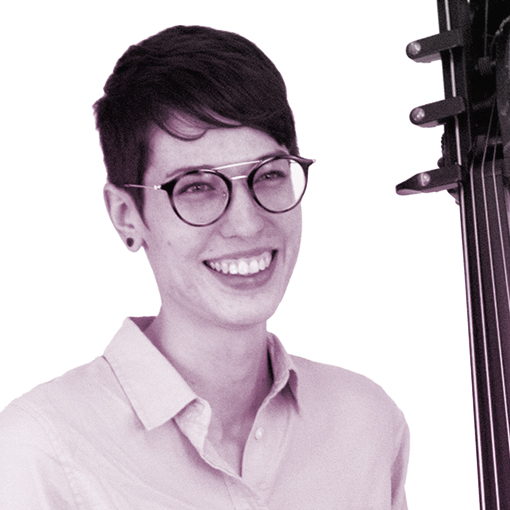Biography
American-born classical bassist Wendy Hellmann grew up in Virginia and began learning the bass as her third instrument at the age of 11. This quickly became Wendy’s primary area of study and in 2010, she moved to the UK to study at the Royal Conservatoire of Scotland, graduating in 2014 with a first class degree in music performance.
Wendy has studied with many distinguished bassists, including Glenn Dewey of the US Marine Band, Jeffrey Weisner of the National Symphony Orchestra, Iain Crawford of the BBC Scottish Symphony Orchestra, Tom Berry of the Orchestra of the Scottish Opera, and soloist Donovan Stokes.
Wendy’s true passion is orchestral performance and in recent years, she has performed with the NVCC-Annandale Orchestra (Virginia), the Prelude Chamber Ensemble, as section principal with the Royal Conservatoire of Scotland Symphony Orchestra and Opera Orchestra, and has participated in side-by-side projects with the Royal Scottish National Orchestra.
Wendy has performed at the prestigious Celtic Connections festival in Glasgow and has played in the Aberdeen-based Sound Festival. She was the bassist for Fuse Ensemble, an avant-garde chamber group based in Washington, D.C., with performances at the Kennedy Center, American University, and in Indianapolis, Indiana at the Intermedia Festival. Wendy has also performed in the Southside Fringe Festival and recorded for short film soundtracks of Glasgow-based group CherryMan Media.
Wendy is an accomplished pianist, violinist, and teacher and at the age of 15, was certified to teach by the American String Teachers Association through a programme training young mentors to take on their first students. Teaching has since been a significant part of Wendy’s life, and since graduation, she has maintained a full studio of pupils on all bowed string instruments.
QUICKFIRE QUESTIONS
What’s on your playlist right now?
I listen to a good deal of Bach. There are so many interpretations and his pieces are played on a wide range of instruments, each with their own strengths and weaknesses. Every performance seems to bring out different aspects in a way I hadn’t thought of before. In contrast to Bach, I also listen to Hindemith frequently. The third movement of his bass sonata has many bittersweet moments, and his sonata for flute is gold. I also enjoy many Russian composers – Stravinsky, Prokofiev, and Shostakovich, to name just a few…
What do you think concerts of the future should look like?
I would enjoy hearing more contemporary pieces played. Every time I hear a Beethoven symphony performed live, I am reminded that the works that he is so famous for today were not always well received during his lifetime. It is through centuries of repetition that his genius, like many other composers of his time, is appreciated. I believe that contemporary music is difficult for audiences to accept because we as listeners are not familiar with it. It is the orchestra’s duty to establish contemporary pieces as part of a modern repertoire through regular performance.
What do you do with your time when you’re not playing music?
It doesn’t happen often, but when I am not running from one musical thing to the next, I like to spend my time outdoors. So many of my days are spent inside with my instrument, it’s nice to get out and go for a hike! There is also something tremendously important in keeping active and in touch with my body and connecting with nature which gives me fresh inspiration for my music.
